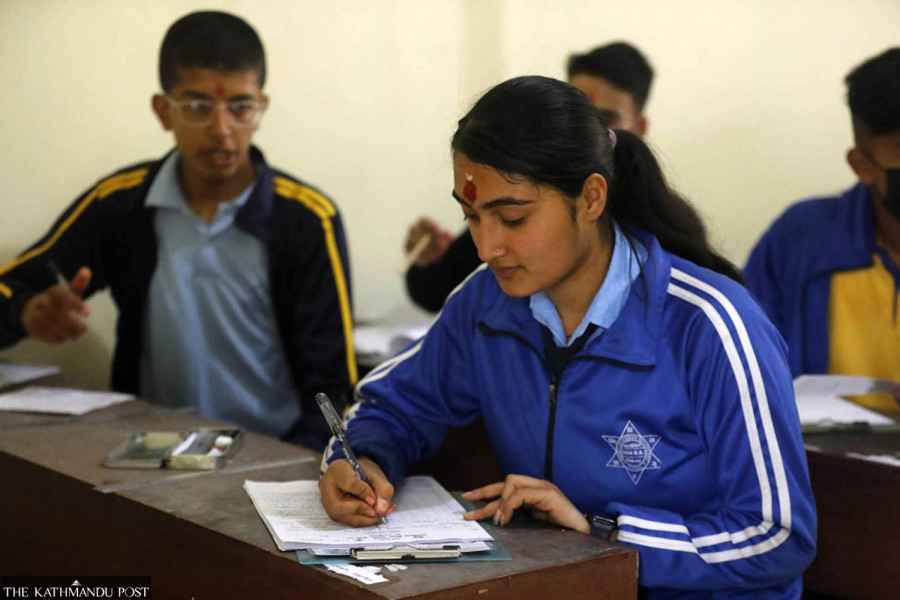National
SEE is here to stay but will be conducted by provinces
House committee overrules the recommendation of its sub-panel to scrap the national exams held at the end of Grade 10.
Post Report
After months of discussion on whether or not to continue the Secondary Education Examination (SEE), members at the Education Committee of the House of Representatives have agreed to hold the test at the provincial level.
In its meeting on Saturday, the committee decided to give continuity to the system of holding the exam, allowing the respective provinces to conduct it. The exams are currently handled by the National Examination Board under the federal government.
A sub-panel of the House committee had recommended scrapping the national exam held at the end of Grade 10. However, some lawmakers opposed the idea, arguing that a board examination is necessary as a qualifier for admission to Grade 11.
As a result, the House committee agreed to its continuation. Advocating for continuation of the test, Education Minister Raghuji Pant claimed that he has received requests from the students not to scrap the SEE.
The committee endorsed the proposal tabled by its chair, Ammar Bahadur Thapa, which states that the SEE, which is held at the end of Grade 10, will be conducted at the provincial level. However, the tests would be held in coordination with the board.
As per the agreed provision in the bill, it will come into effect after respective provinces pass a law to conduct the exams. “Until then, the board will continue to administer the SEE,” as per the agreed provision.
As the Constitution of Nepal says local governments enjoy the authority to manage education up to secondary level, cross party lawmakers had questioned whether it would be unconstitutional to allow the provinces to conduct the SEE.
Pant, backed by the law ministry official, had claimed it doesn’t contradict the constitution as other federal countries are also holding similar practices.
Provincial governments have long been demanding the authority to conduct the SEE.
The House committee has also resolved the issue of district level education offices which had been another contentious issue in the bill. Despite reservations from some lawmakers, the House committee has agreed to continue Education Development and Coordination Units in all the districts.
CPN-UML lawmaker and former education minister Bidya Bhattarai, among others, had objected to the proposal of giving continuity to the units.
She had argued it would be unconstitutional to keep such offices as the local governments enjoy all the authority to manage school education.
These units will work as the subordinate offices of the federal government while also liaison between the provincial and local governments, as per the agreement.
Such units, as per the agreement, will facilitate school mapping, evaluate students' learning achievements and collect educational data at the district level. Maintaining records of school properties, recommending rewards and incentives to outstanding teachers and schools based on students' performance and coordinating with local governments will be other tasks they will be carrying out.
Performing duties assigned by the federal, provincial governments, the board, and relevant commissions would be their other responsibilities. The local governments have long been warning against continuing such offices claiming that they have encroached upon their jurisdiction defined by the constitution.
As demanded by teachers, the House committee has also agreed on periodic promotion of teachers. The teachers are eligible for promotion if they have completed 10 years of service in a third class position and 12 years in a second class position.
The education committee has been holding discussions on the bill on a daily basis as the ruling party's deadline to endorse the bill concludes on Sunday. The committee meeting has been called for Sunday morning, hours before the lower house meets, to finalise the bill.
Nepali Congress Chief Whip Shyam Ghimire and CPN-UML Chief Whip Mahesh Bartaula, along with the committee chair Thapa, in an agreement with the agitating teachers, have pledged to endorse the bill by June 29.
The agitating teachers withdrew their protests in Kathmandu following the nine-point agreement signed on April 30.




 8.22°C Kathmandu
8.22°C Kathmandu













